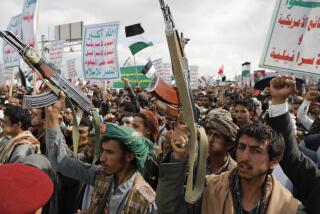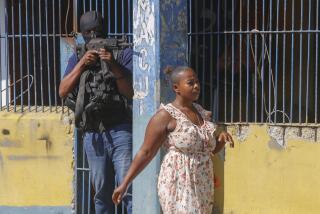Violence spreads in Yemen as foreign diplomats struggle to end the crisis
Reporting from Manama, Bahrain — Gunfire and funerals have been spreading across Yemen as international negotiators have yet to come up with a plan to edge President Ali Abdullah Saleh from power and prevent widespread protests from tipping the impoverished nation into a civil war that could spur unrest across the region.
The country’s major cities erupt almost daily in violence as security officials and thugs loyal to the government attack anti-Saleh protesters with tear gas and live ammunition. On Wednesday, a gunman on a motorcycle fired into a crowd in the western port city of Hudaydah, killing a demonstrator.
As the protest movement nears its third month, the international community, including the U.S. and Arab states, has not compelled Saleh to step down from his 32-year rule, even as tribes and government officials have abandoned him. The volatile leader, whose popularity has tumbled amid corruption and failed economic policies, has for weeks given contradicting signals that have exasperated his allies and a growing list of enemies.
Saleh was quoted by the state news agency as saying he would not be overthrown by “conspiracies or coups.... Those who want power or to gain the seat of power should do it by heading to the ballot box.”
A day after the U.N. Security Council could not agree on a statement about Yemen, tens of thousands of anti-government protesters on Wednesday surged through the ancient streets of the capital, Sana. The demonstrators have grown bolder in recent days by pushing closer to heavily protected government offices.
The Gulf Cooperation Council, which consists of Saudi Arabia and five other Persian Gulf states, is concerned over the prospect of economic chaos and civil war emanating from a Yemen already confronting a divided army, a secessionist movement and a growing Al Qaeda threat. Like Libyan leader Moammar Kadafi and Syrian President Bashar Assad, Saleh is relying on brutality and veiled hints of compromise to silence dissent.
“We are near a consensus from the GCC on the importance of this regime’s departure,” said Sultan Atawani, head of the opposition Nasserite Unionist party, who met this week with high-ranking diplomats from the United Arab Emirates and other neighboring countries.
The difficulty centers on finding a mix of enticements that will persuade Saleh to step aside. One of the elements under discussion offers the president and his family, including his son and relatives who control military and intelligence units, immunity from prosecution in the deaths of more than 100 protesters. Western countries are calling on Saleh to hand power to his vice president and for elections to be held within 60 days after his departure.
“The issue of any such guarantees cannot be used by the president to gain more time and perpetrate new crimes,” Atawani said. “We say to our brothers in the gulf that such a move cannot be made at the negotiating table, but only by a new government when it comes.”
Officials insist that a post-Saleh scenario is emerging. Under proposals supported by gulf countries, Yemen’s opposition, an incongruous collection of socialist, Islamist and other parties, would take over the presidency in a transitional government. Representatives from the president’s ruling party on Tuesday met separately with GCC officials in Dubai, United Arab Emirates, in what appeared to foreshadow Saleh’s eventual exit.
“The president has to negotiate in order to secure a dignified transfer of power now, or he will never get the chance,” said Murad Azzani, a political analyst at Sana University. “What he wants to do now is avoid the Egyptian scenario of having the president under arrest and his party dissolved. Saleh wants his party to survive, and to exert power through it.”
But Saleh’s General People’s Congress is in jeopardy. Prominent members have broken away to form the Justice and Development Party. This political insurrection directly challenges the ruling party’s near-monopoly control of the government by reaching out to hundreds of thousands of young protesters angry at poverty and high unemployment.
“Above all, we represent solidarity with the popular demands and see that the common Yemeni interest lies with the immediate resignation of the president,” said Abdul Aziz Jabbari, a former lawmaker and a founder of the new party.
Many young protesters, however, don’t feel represented by any political group. Slogans of “No to parties and no partisanship” plastered on demonstrators’ tents in Sana indicate that a new government will have to contend with a potent, disenfranchised voice. It was the protesters, not opposition groups or other parties, who forced the international community to intervene and put Saleh on the brink.
“Future leaders will have to have some resonance with the people,” Azzani said. “These parties won’t go anywhere if they aren’t rooted in the culture of the movement that Yemen has witnessed.”
A special correspondent in Sana contributed to this report.
More to Read
Sign up for Essential California
The most important California stories and recommendations in your inbox every morning.
You may occasionally receive promotional content from the Los Angeles Times.











